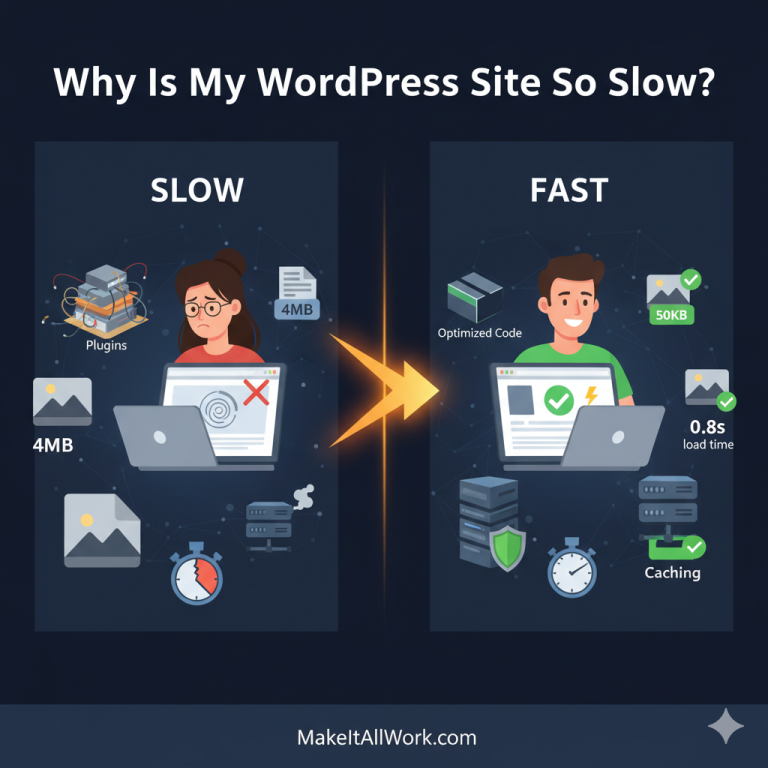Why Is My WordPress Site So Slow? (And How to Fix It!)

At MakeItAllWork, the question we hear most often after a client has launched their WordPress site is: “Why is it so slow?”
It’s frustrating. You’ve invested time and money, but your site drags, causing visitors to bounce and search rankings to suffer. The good news is that site speed issues are almost always fixable.
We’ve diagnosed thousands of slow sites. The problem is rarely one single thing; it’s usually a combination of issues acting like weights dragging down your performance. Here’s our guide to the most common speed-killers and exactly how to fix them.
1. Is Your Hosting Letting You Down?
This is often the fundamental problem. Think of your website hosting as the land your house (your website) is built on. If the land is shaky or overcrowded, the house won’t stand well, no matter how nicely you decorate it.
- The Problem: Many small businesses start with cheap, shared hosting. In shared hosting, your site lives on a single server with hundreds of other websites, all competing for the same limited resources (CPU, RAM). When one site gets a traffic spike, everyone else slows down.
- The Fix: Upgrade to Managed WordPress Hosting or a good VPS (Virtual Private Server). Managed hosting is optimized specifically for WordPress, providing dedicated resources, better caching, and often superior security. While it costs more, the performance boost is dramatic and directly impacts your revenue.
2. Are Your Images Too Heavy?
High-quality images look great, but if they aren’t optimized for the web, they are huge performance hogs.
- The Problem: Uploading original, high-resolution photos straight from your camera or phone (often several megabytes each) forces a user’s browser to download massive files every time a page loads. This severely bottlenecks load time.
- The Fix: You need to adopt a three-step image optimization strategy:
- Resize: Scale images to the exact size they will be displayed on the screen (e.g., don’t upload a 5000px image for a 500px slot).
- Compress: Use a plugin (like Smush or Imagify) or an online tool to reduce the file size without noticeable loss of quality.
- Use Next-Gen Formats: If possible, convert images to modern formats like WebP, which offer better compression than traditional JPEGs and PNGs.
3. Are You Running Too Many (or Bad) Plugins?
Plugins are what make WordPress powerful, but they are also the number one source of performance degradation.
- The Problem: Every plugin adds code, database queries, and often external scripts that must load every time a user visits a page. Bloated plugins, especially those poorly coded or abandoned by the developer, can create conflicts and significantly slow down your site’s backend and frontend.
- The Fix:
- Audit Regularly: Deactivate and delete any unused plugins.
- Consolidate: Can two or three plugins be replaced by one robust tool?
- Test: Before installing a new plugin, check its reviews and see if it’s actively maintained. Use a speed testing tool (like Google PageSpeed Insights) before and after installation to measure its impact. Only use plugins you absolutely need.
4. Is Your Caching System Missing or Broken?
Caching is the most effective way to instantly speed up most WordPress sites.
- The Problem: Without caching, every time a user visits a page, WordPress has to execute PHP code, query the database, and build the page from scratch. This takes time and taxes your server.
- The Fix: Implement robust caching. Caching saves a pre-built HTML version of your page. The next user to visit gets that ready-made file, which loads almost instantly. We highly recommend using a dedicated caching plugin (like WP Rocket, LiteSpeed Cache, or W3 Total Cache) and ensuring browser caching is correctly configured.
5. Is Your Theme Too “Bloated”?
Many stunning, multipurpose themes look great but come loaded with features, shortcodes, and bulky frameworks you’ll never use.
- The Problem: These “bloated” themes contain excessive CSS and JavaScript files for features that are irrelevant to your site. Your site has to load all of this unnecessary code, slowing down the display time.
- The Fix: Prioritize lightweight, minimalist themes built for speed (like Astra, GeneratePress, or Kadence). If you are using a page builder, ensure it is a high-performance one (like Elementor or Beaver Builder) and that your theme integrates with it cleanly.
Why Speed Matters for Your Business
Fixing these speed issues isn’t just about making you feel better; it’s essential for success:
- SEO: Site speed is a confirmed ranking factor for Google. Faster sites rank higher, especially for mobile searches.
- User Experience (UX): Studies show that a two-second delay can increase your bounce rate (visitors leaving immediately) by over 100%. Users expect fast websites.
- Conversions: Whether you sell products or capture leads, faster load times mean higher conversion rates. Customers don’t complete forms or purchases on slow, frustrating sites.
Ready to Stop Crawling and Start Sprinting?
Trying to diagnose and fix these issues yourself can be time-consuming and technically challenging. You need a comprehensive performance audit that tackles the issues holistically—from hosting and database optimization to frontend code cleanup.
At MakeItAllWork, we specialize in comprehensive WordPress speed optimization. We’ll identify the specific bottlenecks slowing down your site and implement proven, measurable fixes to get your site loading in under two seconds.
Stop losing customers to slow loading times!
Contact us to contact us for a free, detailed Speed Analysis of your WordPress site and let us make it all work quickly!

 ALL BLOGS
ALL BLOGS


